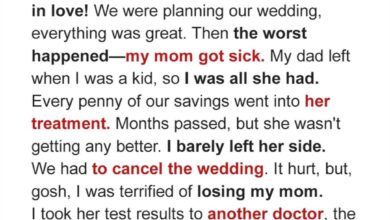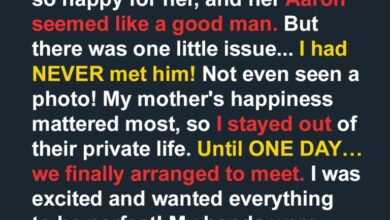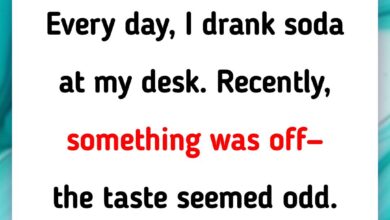I didn’t have much money when I was growing up.

I grew up without much money.
When I was 13, I went to a classmate’s house and stayed for dinner. While we ate, I noticed everyone at the table staring at me. The next day, I came home from school and was surprised to see my friend’s mom at our house. My mom’s face was red, and she looked serious. She turned to me and said, “We need to talk.”
I had no idea what was happening. My friend’s mother, Ms. Allen, stood by the window, looking both worried and uncomfortable. I was a shy kid, and I immediately thought I had done something wrong. I tried to remember if I had broken something or said anything rude the night before.
My mom asked me to sit down, and then Ms. Allen spoke in a soft voice. She said, “I noticed how you acted during dinner last night. At first, I didn’t understand why you wouldn’t look at anyone, but now I realize… you’re just not used to having enough food. You looked hungry, but also embarrassed.”
For a moment, I couldn’t fully understand her words. All I could remember was the warm bread, thick slices of meat, and fresh vegetables on the table. The meal had amazed me so much that I could barely focus on anything else. I must have stared at the food like it was something I had never seen before.
My mom cleared her throat and, still blushing, said, “Ms. Allen wants to help us in some way.”
My chest tightened. I didn’t want help. I was tired of people giving us things out of pity. But when I looked at Ms. Allen, I saw that she really meant it. She wasn’t looking at me like I was some helpless stray. She looked truly concerned, like she wanted to do something good. Still, my pride hurt.
She stepped closer and said gently, “I was wondering if you’d like to come over for dinner more often. Maybe even help me cook sometimes. It doesn’t have to be anything official. But I saw the way your face lit up, even for just a moment, when you had a real meal. I know food is sometimes scarce at home.”
I felt something heavy in my chest—relief, shame, and a small spark of curiosity. Cooking with Ms. Allen? That actually sounded… fun. Maybe even exciting.
I glanced at my mom. Her eyes were full of tears, though she tried to blink them away. “Only if you want to,” she said softly. “I can’t give you meals like that, but Ms. Allen is offering.”
I took a deep breath. My mind was spinning—fear of being judged, embarrassment, and the unexpected warmth of Ms. Allen’s kindness. But in the end, my hunger and my curiosity won. I nodded and said, “Okay. I’ll try.”
From that day on, every Wednesday after school, I went to Ms. Allen’s house. I’d help her chop vegetables, stir soup, or season the chicken. She taught me little tricks—how to peel potatoes without wasting half of them, how to tell when pasta was perfectly cooked. Sometimes her daughter, Zara, would walk in and laugh at how serious I looked with an apron on. But overall, it felt comfortable, almost like a second home.
The first time I went, I was so nervous I almost didn’t ring the doorbell. But before I could turn away, Ms. Allen opened the door and smiled. “Perfect timing! The onions are ready.” That was it—no awkwardness, no pity. We just got to work.
Over time, I realized she was teaching me more than just cooking. She showed me how to be patient with people, how to share a meal, and how to take pride in doing something well. I started feeling more confident, especially when I smelled a dish I had helped make.
One day, after we finished baking biscuits, Ms. Allen asked, “Where do you see yourself when you’re older?”
I hesitated. No one had ever really asked me that. “I don’t know,” I mumbled. “Somewhere, I guess.”
She wiped her hands on a towel and looked at me. “You’re allowed to dream bigger than ‘somewhere,’ you know that, right?”
I shrugged. “It’s hard to dream big when you can barely afford dinner most days. People like me don’t get many choices.”
She looked at me thoughtfully. “Maybe that’s exactly why you should dream bigger—so you can create a different future for yourself.” Then she smiled gently, her eyes warm. “You have real talent in the kitchen. You don’t just follow instructions—you taste the food, adjust the spices, and notice when something isn’t right. Not everyone has that instinct.”
Her words stayed with me for days. The next time I came over, Ms. Allen handed me a small notebook. “Write down the recipes we make,” she said. “And if you come up with your own ideas, jot them down. You never know where it might lead.”
So I did. Over time, that notebook filled up with everything we cooked together—stews, baked fish, roasted vegetables, pasta sauces, even banana bread. Every time we made something new, I wrote down how we did it. I asked questions, experimented, and paid attention. When I wasn’t cooking, I was thinking about it. For the first time in my life, I had something that felt like my own special talent.
As the years passed, things changed. My mom worked different jobs, saving every bit she could. We never became rich, but we managed to get by. And my bond with Ms. Allen only grew stronger. I started babysitting Zara’s younger siblings on weekends. I helped Ms. Allen clean up after big family gatherings. Sometimes, if I found a good deal at the market, I’d bring over groceries.
Then, right after my sixteenth birthday, Ms. Allen pulled me aside and handed me an envelope. Inside was a gift certificate for a culinary workshop in town—a class for teens interested in cooking as a career. “It’s not a huge thing,” she said, “but I think you’ll really enjoy it. A local chef runs it and teaches the basics of working in a professional kitchen.”
I felt tears in my eyes. No one had ever given me something like this before, never told me I had enough potential to learn from a real chef. I could barely find the words to thank her. But Ms. Allen just smiled and waved her hand like it was nothing. “Just promise me you’ll show me everything you learn.”
That workshop changed everything for me. I realized just how much I loved cooking. I met other kids who liked experimenting with flavors, and we shared tips, tasted each other’s food, and gave feedback. For the first time, I started to imagine a future where I could be a chef. Maybe I could open a small café or even teach others the way Ms. Allen taught me.
In my last year of high school, Ms. Allen helped me apply for a culinary scholarship. I didn’t think I had much of a chance, but I figured I had nothing to lose. My mom, who had always been quiet and humble, suddenly became my biggest supporter. We submitted the application and waited. Every day after school, I checked my email with my heart pounding—until one afternoon, I saw it.
I had won the scholarship. I couldn’t believe it. The first thing I did was run to show my mom. Then I knew I had to tell Ms. Allen. We rushed to her house, and the three of us hugged in the middle of her living room. Zara was jumping up and down, and Ms. Allen had tears in her eyes. She held my hands and said, “I knew you could do it.”
Not long after, I left for culinary school. On my first day, as I stepped into the busy kitchen, I thought about my 13-year-old self—the kid who once sat at Ms. Allen’s dinner table, too shy and too amazed to speak. I thought about how one simple invitation to cook had changed my life.
Years later, I opened a small restaurant in my hometown. It’s a cozy place known for fresh, home-cooked meals. My mom still can’t believe it sometimes, but she loves stopping by to watch me work. Ms. Allen and Zara visit too, and we laugh about the days when I struggled to chop an onion. Now, I hire local teenagers, some from difficult backgrounds, and give them a chance to learn—just like Ms. Allen did for me.
Looking back, I see that the night I stayed for dinner at my classmate’s house was a turning point. That small act of kindness gave me the confidence to dream beyond my situation.
If there’s one lesson I’ve learned, it’s this: kindness can change a life. Sometimes, all it takes is someone believing in you and offering you a place at the table—both literally and figuratively. There’s no shame in accepting help when it’s given with genuine care. And even more importantly, there’s power in passing that kindness on to others.
I hope this story reminds you to look for moments where you can help someone—or ask for help if you need it. Life has a way of surprising us in the best ways when we stay open to kindness. Thanks for reading, and if this story touched you, share it with someone who might need a little hope today.



